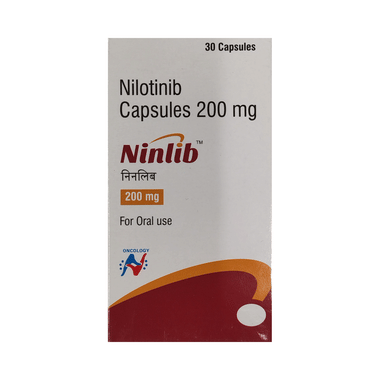-
Nilosure 200mg Capsule (Rs.513)
Composition: Nilotinib (200mg)
-
Knilonat 200 Capsule (Rs.1125)
Composition: Nilotinib (200mg)
-
Ninlib 200mg Capsule (Rs.4000)
Composition: Nilotinib (200mg)
-
Tasigna 200mg Capsule (Rs.9340)
Composition: Nilotinib (200mg)
All Details About Ninlib Capsule
Find out detailed description, uses, directions of use, side effects, warnings and precautions, frequently asked questions about Ninlib Capsule
Description:
Ninlib Capsule is used in the treatment of blood cancer (chronic myeloid leukaemia). It is used in patients whose disease could not be treated with other medications for leukaemia or who cannot take these medications because of side effects.Ninlib Capsule should be taken on an empty stomach, but try to have it at the same time every day to get the most benefits. Your doctor will decide what dose is necessary and how often you need to take it. This will depend on what you are being treated for and may change from time to time. You should take it exactly as your doctor has advised. Taking it in the wrong way or taking too much can cause very serious side effects. It may take several weeks or months for you to see or feel the benefits but do not stop taking it unless your doctor tells you to.
Headache, nausea, abdominal pain, and rash are very common side effects of this medicine. If you experience severe diarrhea, consult with your doctor or drink plenty of fluids while on treatment. This medicine may reduce the number of blood cells (decrease red blood and white blood cells) in your blood, thereby, increasing the susceptibility to infections. Regular blood tests are required to check your blood cells along with heart, liver and blood uric acid levels and blood sugar or fat level in the body.
Earlier taking it, tell your doctor if have heart disease, liver, or kidney problems or are taking any medicines to treat infections. Many other medicines can affect, or be affected by, this medicine so let your healthcare team know all medications you are using. This medicine is not recommended during pregnancy or while breastfeeding. Employ of effective contraception by both males and females during treatment is important to avoid pregnancy.
Directions For Use:
Take this medicine in the dose and duration as advised by your doctor. Ninlib Capsule is to be taken empty stomach.Side Effects:
Most side effects do not require any medical attention and disappear as your body adjusts to the medicine. Consult your doctor if they persist or if you’re worried about themOrdinary side effects of Ninlib
- Headache
- Nausea
- Abdominal pain
- Rash
- Itching
- Hair loss
- Muscle pain
- Chubbyigue
Warning & Precautions:
FAQs:
What is Ninlib Capsule used for?
How does Ninlib Capsule work in treating leukemia?
Who should not take Ninlib Capsule?
What are the most serious side effects of Ninlib Capsule?
What should I tell my doctor before starting Ninlib Capsule?
Can Ninlib Capsule affect my blood cell counts?
Can I take Ninlib Capsule with food or supplements?
Can I ever stop taking Ninlib Capsule?
Written by:
Dr. T. Sharmila Krishna
M.B.B.S., MD (Biochemistry)
Reviewed by:
Dr. Sureshbabu Yadav
M.B.B.S., DIP.DIAB, F.R.S.H
Disclaimer:
Getomeds primary intention is to ensure that its consumers get information that is reviewed by experts, accurate, and trustworthy. The information and contents of this website are for informational purposes only. They are not intended to be a substitute for professional medical advice, diagnosis, or treatment. Please seek the advice of your doctor and discuss all of your concerns about any disease or medication. Do not disregard or postpone seeking professional medical advice because of something you read on Getomeds. Our mission is to support, not replace, the doctor-patient relationship.
